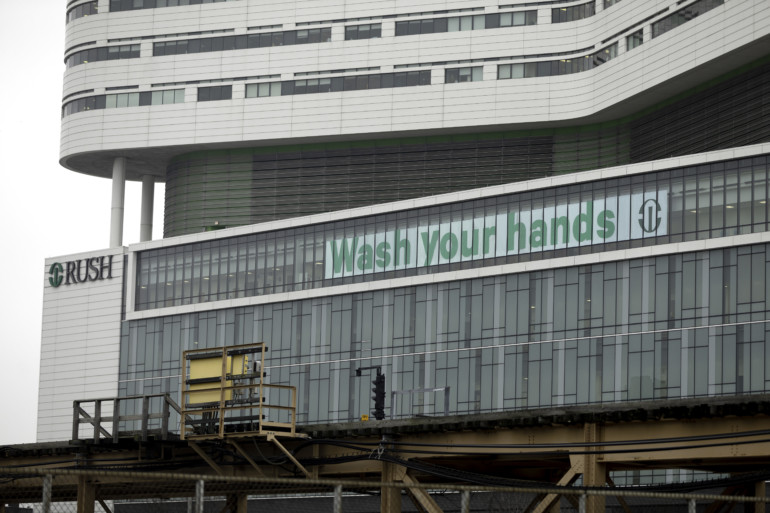The impact of Covid-19 reverberates across all businesses and aspects of life, but hospitals in particular have seen their day-to-day operations tremendously affected.
“It’s been a complete disruptor,” says Dr. Richard Freeman, MD, MBA, FACS, Loyola Medicine‘s regional Chief Medical Officer. “There have been lots of things we didn’t anticipate, don’t think anyone foresaw quite how much this would change health care, both acutely and now chronically.”
With the pandemic ongoing and cases continuing to climb, local hospitals in and around Chicago shared how they are coping.
Loyola University Medical Center
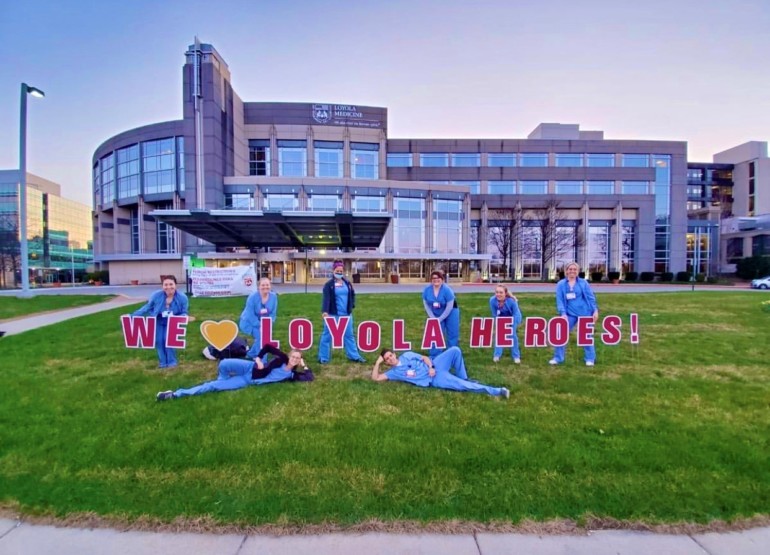
Answers provided by Dr. Richard Freeman, MD, MBA, FACS
How has revenue been affected since Covid-19?
The acute problem was that we had to open some services and close others, to find a way to care for people. The chronic problem was that revenue dropped by three quarters. While revenue decreased dramatically, our expenses stayed the same or went up. It’s a big problem that we are still trying to recover from. I don’t think we will recover right away. We are not like other businesses. Starbucks is closing 400 stores, but we can’t do that. We are looking at how we can operate more efficiently.
What department has been hit the hardest?
All of them. Everyone was disrupted but in different ways. With the initial surge, certain areas were overwhelmed, like the ICU, hospital medicine and the Emergency Department. Other departments stopped non-urgent surgery and paused seeing routine clinic visits.
What is the approximate number of Covid-19 cases the hospital system has seen?
As a system, we saw around 10,000 patients who had Covid – both inpatient and outpatient
How has this impacted business as usual?
We had people who got worse because they weren’t seeing their doctor. We wanted to open as soon as possible to see patients again. We moved to a telehealth platform and checked in with patients by phone. As soon as the government allowed, we opened back up to seeing patients and performing procedures on a limited basis. We want people to see their doctors – don’t put your medical care on hold and stay in contact with your physician and nurse practitioner.
What are the safety measures taken by the hospital to protect other patients?
Loyola Medicine has redesigned the care model from beginning to end on both the outpatient and inpatient side. Outpatient appointments are staggered much farther apart, patients are called the day before to make sure they do not have covid symptoms, they wait in their car and not a waiting room, then go straight to screening and from there are sent to the exam room. We socially distance as much as possible within the exam room, and there is no congregating when they leave.
On the inpatient side, patients get a Covid-19 test a day or so before their procedure. If that’s negative, they come in the day of their procedure, are screened, and then taken right to the room and have their procedure. If they are staying in the hospital, we are taking every precaution there, of course.
NorthShore University HealthSystem
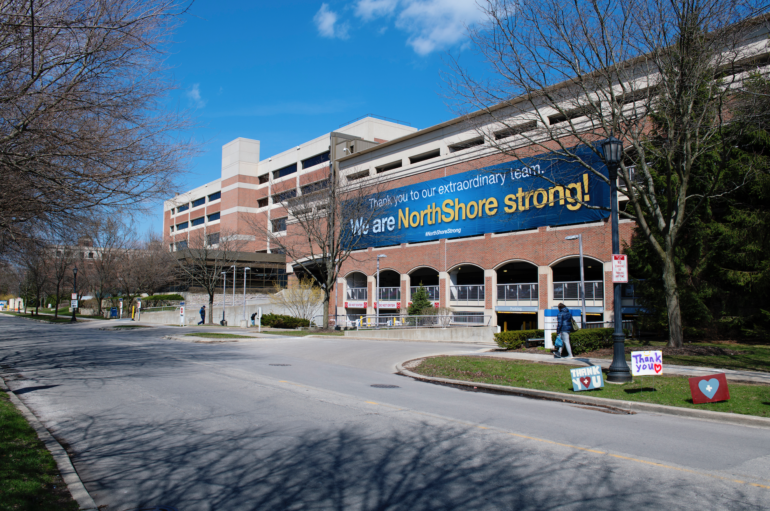
Answers provided by Sean O’Grady, Chief Clinical Operations Officer at NorthShore University HealthSystem
How has revenue been affected since Covid-19?
Due to the extraordinary challenges Covid-19 has presented, we have to contend with the financial realities of dramatically limited operations. In the height of the pandemic, we had stopped all elective services, resulting in significantly reduced revenues while increasing supply and workforce investments for direct care and testing related to our Covid-19 response.
On May 11, we began ramping up surgeries and elective procedures, following a comprehensive plan to ensure the health and safety of our patients and employees. We have experienced a safe return of all services and are encouraged by the progress thus far, but the revenue impact for the year is significant.
Which department was hit the hardest?
There is coordination across our system to provide patients with appropriate care and accessibility. Additionally, NorthShore was the first hospital system in Illinois to implement a fully validated, in-house Covid-19 test based on the published CDC assay. We began testing on March 12th and have performed over 100,000 tests to date. Testing has been key to proper patient care management throughout this pandemic, with test results available in 24 hours or less.
What is the approximate number of Covid-19 cases the hospital system has seen?
About 15,000 NorthShore patients have tested positive for Covid-19, of which nearly 90% of patients have been able to successfully self-care and quarantine at home. Just over 1,000 patients have been hospitalized at NorthShore who are positive for Covid-19.
How has the pandemic impacted business as usual?
The Covid-19 pandemic has motivated our health system to clearly demonstrate the ability to think and perform differently, challenge our assumptions about how things get done and transform the way we deliver patient care. In effect, Covid-19 has created a new normal for us all, and affected every aspect of health care. NorthShore’s tightly integrated network allowed the system to quickly repurpose sites and staff to meet the unique needs of Covid-19. In addition, NorthShore leveraged its electronic resources and significant digital health expertise to support Covid-19 care.
What are the safety measures taken by the hospital to protect other patients?
Since April 1, Glenbrook Hospital has been NorthShore’s Covid-19-designated inpatient hospital during which time we implemented a safe and highly effective Covid-19 care model. While our efforts continue, we are currently experiencing a significantly lower volume of Covid-19 patients who need hospitalization. Glenbrook has one unit devoted to Covid-19 care today and has returned to a full service hospital. All other hospitals and outpatient locations have returned to pre-Covid-19 levels of service.
All Covid-19-related patient rooms have been designated on different inpatient units from those housing non-Covid-19 patients. This is to ensure that all Covid-19 patients are treated in isolated areas of the hospital. Staff working on the non-Covid-19 units will only work with non-Covid-19 patients. All staff—including anyone who has contact with patients—is properly screened per CDC and IDPH guidelines upon entry to all hospital campuses and outpatient locations. All staff will follow proper PPE requirements per CDC and IDPH guidelines. Everyone is required to practice social distancing, wear masks and goggles and frequently wash their hands in all of our clinical settings. We have also implemented advanced cleaning protocols in all of our locations.
Rush University Medical Center
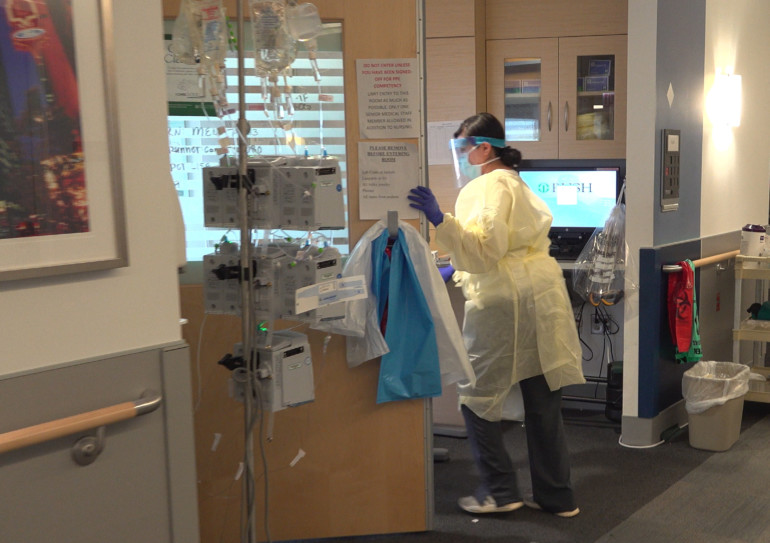
Answers provided by Rush University Medical Center
How has revenue been affected since Covid-19?
Like many hospitals across the country Rush University Medical Center was significantly impacted financially. During the surge, hospitals across Illinois were asked to suspend elective surgeries and that was a major contributor to the impact on revenue.
Which department was hit the hardest?
Obviously, the Emergency Department and the ICU saw a large volume of Covid-19 patients.
What is the approximate number of Covid-19 cases the hospital system has seen?
We currently have approximately 50 Covid-19cases in Rush hospitals.
How has the pandemic impacted business as usual?
Rush resumed elective surgeries in mid-May and has steadily grown patient volumes since. It is critical that those needing ongoing treatment or experiencing an emergency seek care. Rush has been able to resume business as usual safely, adding many new protocols and practices.
What are the safety measures taken by the hospital to protect other patients?
Rush has taken the following precautions to protect our patients and staff including:
- Universal masking of all staff, patients and visitors: Everyone is given a hospital-grade mask as soon as they enter any Rush facility and all staff members will be wearing masks as well. This gives an added level of protection for every single person coming into the Medical Center and clinics.
- Temperature scanning at entrances: All patients and staff coming to any Rush facilities have their temperature taken by a contactless, infrared temperature scanner at all entrances.
- Enhanced cleaning and disinfecting: Environmental Services staff is adopting new strategies for routine cleaning and using hospital-grade disinfectant with additional focus on cleaning high touch areas, public areas, patient rooms, waiting rooms and more.
- Social distancing in waiting rooms and common areas: Waiting areas throughout the Medical Center have been reconfigured to ensure that seating is at least six feet apart.
- Minimal waiting in clinics: Now that we have shifted many appointments to virtual care, Rush is carefully managing the patient flow in our clinics to minimize wait times and significantly reduce the overall length of stay in the clinical setting.
- Cellphone parking lot: Rush is offering a safe nearby, free parking area for loved ones to comfortably stay in their cars, while waiting for patients who are having appointments, tests or procedures.
- Enhanced screening protocols for all patients: There is a 24/7 call center that includes nurses on staff who screen patients over the phone at the time of scheduling and the night before an appointment/procedure. Rush staff ask several questions about possible Covid-19 symptoms and will guide patients on next steps if symptoms exist.
- Video visits: We have moved as much care possible to virtual care – for existing patients and new patients. For patients who are coming in for treatments, surgery or other care, we’ve been able to do a portion of their care as a video visit before they come to campus. This limits the amount of people they come into in-person contact with and lessens time on campus overall.
- Enhanced Covid-19 testing: If you have symptoms of Covid-19 or if you have a temperature of 100°F, we are offering testing for patients in our designated Covid-19 clinic.
- Isolation of Covid-19 patients: Rush is safely isolating Covid-19 patients from others – in both inpatient and outpatient areas.
- Robust testing of Rush staff: To ensure the health of our staff, Rush is doing daily temperature checks, symptom monitoring, broad testing of any staff for Covid-19 and antibodies.
Ann & Robert H. Lurie Children’s Hospital of Chicago
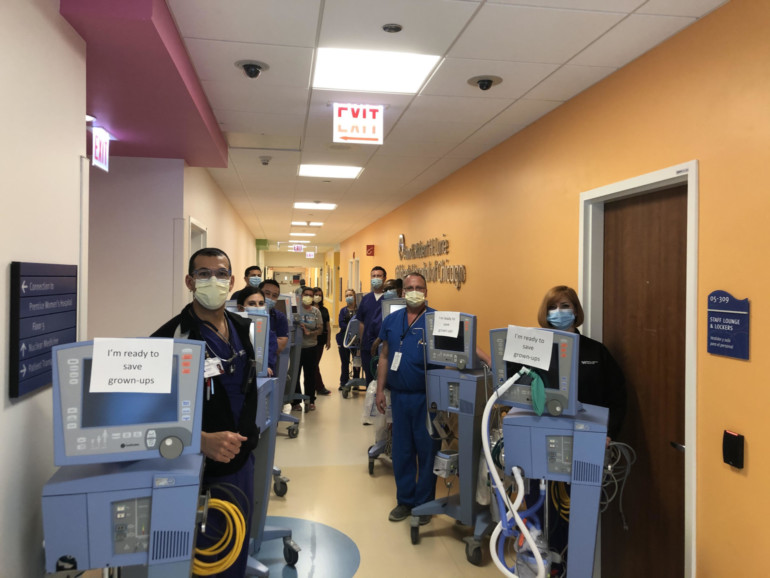
How has revenue been affected since Covid-19?
In response to the Governor’s stay at home order and ban on all non emergency hospital services, Lurie Children’s shut down clinics and postponed many procedures. As a result, our revenues dropped by 40%. When you add the additional costs for supplies and equipment due to Covid-19, we suffered income losses of $75 million in March, April and May – 10 million per week during March, April and parts of May. We expect to have lost $92 million by the end of August.
We are working closely with Senator Durbin and the Illinois Congressional Delegation to secure vital Covid-19 relief funds. Thus far we have received $22.2 million in relief and are working closely with HHS, Senator Durbin and the Illinois Congressional Delegation to secure essential additional relief so that we can ensure the future viability of Lurie Children’s for the children of today and tomorrow. As the only freestanding full service children’s hospital in Illinois, Lurie Children’s did not receive funds that other hospitals who serve adults and children received via Medicare.
What department has been hit the hardest?
The losses are across the Medical Center. People stopped bringing their children to the emergency room and inpatient volume was down except for babies in the NICU and the sickest kids in ICU and Cardiac Critical care floors. Surgeries and procedures came to halt with the exception of life-saving, vital surgeries.
What is the approximate number of Covid-19 cases the hospital system has seen?
Thankfully, Covid-19 is less severe among children. We have tested over 10,000 patients to date with 675 positive, 117 ever hospitalized and 10 currently admitted positive (as of July 20) for Covid-19. Some of these patients have MIS-C and we are heartened to have some of the top experts in the world on pediatric Kawasaki’s disease, which may be related, guiding best practices for these children.
How has the pandemic impacted business as usual?
We have not had any layoffs to date- we have implemented senior leader pay cuts and two weeks of rotating unpaid furloughs, a pause on hiring and capital projects, and we are working hard to avoid major cuts to staff. Our faculty and staff are highly trained pediatric specialists. We are looking at many ways to improve efficiencies before we significantly trim staff. Our goal is to continue to provide the best care to as many children in the city, state and beyond without impact.
What are the safety measures taken by the hospital to protect other patients?
From early on in the pandemic, we implemented universal symptom screening and masking of all faculty, staff, patients and visitors. We restrict visitors to necessary adult caregivers, use PPE and isolation precautions for patients with confirmed or suspected Covid-19, have acquired adequate supplies of PPE and hand washing and sanitizing stations, and strictly enforce appropriate distancing wherever possible. We also developed a diagnostic test for Covid-19 and greatly expanded testing of children in the medical center and community.
Northwestern Memorial Hospital & Northwestern Medicine Lake Forest Hospital
How has revenue been affected since Covid-19?
Northwestern Medicine does not share that information.
What department has been hit the hardest?
Like all hospitals throughout the country, Covid-19 has had an impact to our inpatient and outpatient settings.
What is the approximate number of Covid-19 cases the hospital system has seen?
While Northwestern Medicine cannot share that information, feel free to reach out to the Illinois Department of Health for that information.
How has the pandemic impacted business as usual?
Strict plans and protocols were put in place to accommodate both Covid-19 and non-Covid-19 patients.
What are the safety measures taken by the hospital to protect other patients?
Visitor restrictions remain in place at all Northwestern Medicine inpatient and outpatient facilities. We continue to evaluate restrictions at each Northwestern Medicine facility.
Screening for Illness
- Patients with inpatient surgeries or procedures undergo thorough testing prior to their arrival. Anyone exhibiting symptoms will be triaged for care or asked to return home.
- Patients and companions entering Northwestern Medicine outpatient departments and clinics will be screened for Covid-19 symptoms at the time of scheduling and when they arrive at their clinical destination.
- Inpatient visitors will be screened for symptoms and have their temperature taken at the hospital entrance.
Physical Distancing
Everyone must maintain a distance of at least 6 feet from each other unless they are giving or receiving direct patient care. This policy is supported with:
- Modified seating plans in waiting areas, cafeterias and common spaces.
- The placement of signs in waiting areas to indicate appropriate spacing.
- Restrictions on elevator use. Where elevators are required, use is limited to no more than two persons at a time. Please allow additional time to get to your destination.
Universal Masking
With the exception of inpatients who are in their hospital rooms, everyone is required to wear a mask while in our facilities. If you are unable to wear a mask due to a disability or medical condition, please contact your physician office to schedule a telehealth visit or to discuss a reasonable accommodation. If you arrive wearing your own mask, we will ask you to replace or cover it with a mask provided by Northwestern Medicine. We will also ask you to remove any gloves you are wearing.
Extensive Cleaning Process
Our Environmental Services teams continue to perform rigorous cleaning of our hospitals and physician offices, and have increased the frequency of cleaning and disinfecting high-touch surfaces.
Hand Sanitizer
Hand sanitizer dispensers are available throughout our facilities.
More from Better:
- North Shore Dining: Where to Eat and Drink in Evanston
- The Chicago-area Private School Guide
- On the Market: 5 Hot Chicago and North Shore Properties With Stunning Outdoor Spaces
 Shannan Younger is a writer living in the western suburbs of Chicago with her husband and teen daughter. Originally from Ohio, she received her undergraduate and law degrees from the University of Notre Dame. Her essays have been published in several anthologies and her work has been featured on a wide range of websites, from the Erma Bombeck Humor Writers Workshop to the BBC. She also blogs about parenting at Between Us Parents.
Shannan Younger is a writer living in the western suburbs of Chicago with her husband and teen daughter. Originally from Ohio, she received her undergraduate and law degrees from the University of Notre Dame. Her essays have been published in several anthologies and her work has been featured on a wide range of websites, from the Erma Bombeck Humor Writers Workshop to the BBC. She also blogs about parenting at Between Us Parents.
